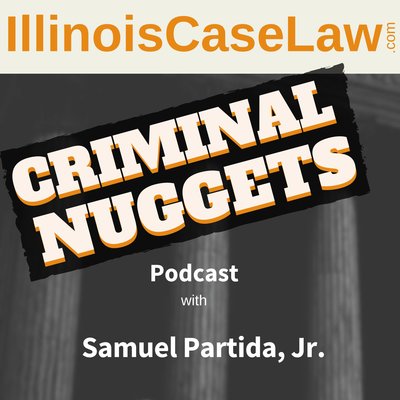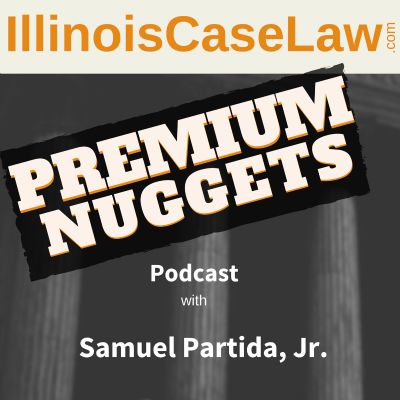Apr 5, 2017
People v. Staple, 2016 IL App (4th) 160061 (December). Episode 317 (Duration 21:49)
This case does a great job of digging down into the very basics of double jeopardy.

You Ever Notice...
You ever notice how at the end of a case that has been reversed and remanded for a new trial judges are very careful to include a line that says that Defendant was proven guilty beyond a reasonable doubt.
What's that all about?
"Enter To Win A FREE MP3 Player Completely Pre-Loaded With All My Prior Premium Episodes!"
 I only have one of these portable
MP3 players to give away. So hit the button below and enter your
name, so you don't miss the chance to win this thing.
I only have one of these portable
MP3 players to give away. So hit the button below and enter your
name, so you don't miss the chance to win this thing.
The answer lies in the doctrine of double jeopardy.
In this broadcast I republished an episode that was previously only available to Premium Nugget subscribers is now made available to everyone for free.
Two DUI Charges
The case begins with the fact that the defendant was simultaneously charged with misdemeanor DUI and felony DUI charges exact same course of conduct.
He had both a “DT” file and a “CF” file.
Dismissal
He plead guilty to the misdemeanor and moved the trial court to dismiss the felony charges, claiming double jeopardy had attached when he plead to the misdemeanor.
The trial court granted defendant’s motion to dismiss.
The reviewing court reversed this decision.
Double Jeopardy
The fifth amendment to the United States Constitution, made applicable to the states via the fourteenth amendment, provides, in part, that no person shall “be subject for the same offense to be twice put in jeopardy of life or limb.” U.S. Const., amend. V. See also Ill. Const. 1970, art. I, § 10; 720 ILCS 5/3-4.
The double jeopardy clause protects against
(1) a second prosecution for the same
offense following acquittal,
(2) a second prosecution for the same offense following conviction,
and
(3) multiple punishments for the same offense.
However, the rules with regard to double jeopardy, however, should not be applied in a mechanical nature, especially if the situation is such that the interests the rules seek to protect are not endangered and a mechanical application would frustrate society’s interest in enforcing its criminal laws.
Lesser Included
Notably, double jeopardy clause did not prohibit the State from prosecuting lesser included offenses along with the more serious charges.
When a defendant pleads guilty to lesser included offenses he has not been exposed to conviction on the charges to which he pleaded not guilty, nor has the State had the opportunity to marshal its evidence and resources more than once or to hone its presentation of its case through a trial.
The acceptance of a guilty plea to lesser included offenses while charges on the greater offenses remain pending, moreover, has none of the implications of an implied acquittal which results from a verdict convicting a defendant on lesser included offenses rendered by a jury charged to consider both greater and lesser included offenses.
There simply isn’t any of the governmental overreaching that double jeopardy is supposed to prevent.
Shield Not A Sword
On the other hand, ending prosecution would deny the State its right to one full and fair opportunity to convict those who have violated its laws.
In this case, it is clear defendant was aware of the pending felony charges when he pleaded guilty to the misdemeanor charges.
As the United State Supreme Court stated, a defendant should not be entitled to use the Double Jeopardy Clause as a sword to prevent the State from completing its prosecution on the remaining charges.
This case presents none of the interests double jeopardy seeks to protect.
Holding
Defendant was well aware of the pending felony charges when he pleaded guilty to the misdemeanor charges. Additionally, the State has not marshaled its resources and evidence more than once or honed its presentation of the case through a trial on the misdemeanor charges.
Accordingly, the court concluded double jeopardy does not bar the State from pursuing the felony charges that were pending at the time defendant pleaded guilty to the lesser-included misdemeanor charges.
Before You Go…
If you're reading this then you've made yourself eligible to enter into a drawing to win a free mp3 player pre-loaded with all my prior Premium Nugget episodes.
This stuff is not available anywhere else.
"Enter To Win A FREE MP3 Player Completely Pre-Loaded With All My Prior Premium Episodes!"
 I only have one of these portable
MP3 players to give away. So hit the button below and enter your
name, so you don't miss the chance to win this thing.
I only have one of these portable
MP3 players to give away. So hit the button below and enter your
name, so you don't miss the chance to win this thing.



